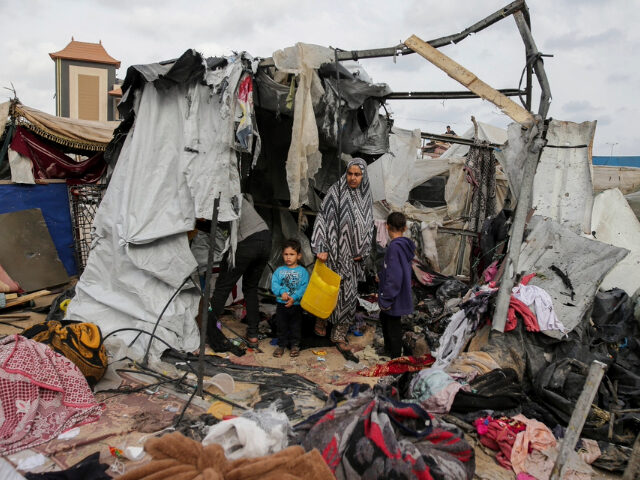The deadly fire that broke out in Rafah following an Israeli airstrike outside the designated “humanitarian zone” Sunday night may have been caused by the secondary detonation of Hamas munitions located near a civilian safe zone, according to the Israeli military.
The airstrike, which eliminated several senior Hamas commanders, has been the subject of international condemnation due to the apparent civilian casualties. However, Israel said it prepared carefully and followed international law in launching a precision strike that was not anticipated to cause wider damage.
The Israel Defense Forces (IDF) is currently investigating the possibility that the deadly fire, which broke out after the airstrike at a complex housing displaced Gazans in Rafah, was caused by the secondary detonation of Hamas munitions or other flammable material stored near the target of a precise airstrike against senior Hamas terrorists, according to IDF Spokesman Rear Adm. Daniel Hagari, who provided further details about the incident in an English-language press conference on Tuesday.
Hagari explained that the IDF conducted a targeted strike on senior Hamas terrorists in Rafah based on precise intelligence, which unintentionally ignited a fire that killed 45 civilians. He emphasized that the strike was away from the humanitarian zone, using minimal explosives, and the fire’s cause is under investigation, with suspicions that nearby stored Hamas weapons may have detonated.
“Signals intelligence intercepted some phone calls that reinforce this concern, raising the possibility that weapons stored in a nearby compound caught fire,” he said before playing a recorded call in which Gazans discuss the explosion.
Hagari assured a thorough and transparent investigation into the incident, vowing it would be “swift, comprehensive, and transparent.”
The IDF reportedly fired two 17-kilogram munitions at senior Hamas terrorists in Rafah on Sunday night, which were too small to ignite a fire on their own.
The airstrike targeted senior Hamas commanders Yassin Rabia and Khaled Nagar, both previously involved in deadly attacks against Israelis and planning further attacks, based on intelligence reports.
“Contrary to reports, we conducted the strike outside the area that we designated as a humanitarian area and called civilians to evacuate to. Our strike was over a kilometer and a half away from the al-Mawasi humanitarian area, what we call the safer zone,” Hagari said.
Highlighting the measures taken to avoid civilian harm, he detailed the steps taken before the strike, including “aerial surveillance, using specific munitions to minimize collateral damage, delaying the attack to further assess the expected civilian presence, and other means.”
He also noted that the military is “looking into all possibilities, including the option that weapons stored in a compound next to our target, which we did not know of, may have ignited as a result of the strike.”
“It should be noted that Hamas has been operating in this area since October 7,” he added.
Palestinian sources initially claimed that 50 people had been killed — including civilians.
The IDF issued a statement describing the airstrike:
Earlier this evening, an IAF aircraft, in an IDF and ISA intelligence-based strike, eliminated the terrorist Yassin Rabia, the Commander of Hamas’ leadership in Judea and Samaria, as well as Khaled Nagar, a senior official in Hamas’ Judea and Samaria wing.
The strike was carried out in the area of Tal as Sultan, in northwest Rafah, based on precise intelligence.
Hamas’ Judea and Samaria wing is responsible for the planning, funding, and carrying out of terror attacks throughout Judea and Samaria and within Israel.
The terrorist Yassin Rabia managed the entirety of Hamas’ terrorist activity in Judea and Samaria, transferred funds to terror targets and planned Hamas terror attacks throughout Judea and Samaria.
In the past, Rabia carried out numerous murderous terror attacks, including in 2001 and 2002, in which IDF soldiers were killed.
The terrorist Khaled Nagar, a senior official in Hamas’ Judea and Samaria Headquarters, directed shooting attacks and other terrorist activities in Judea and Samaria, and transferred funds intended for Hamas’ terrorist activities in the Gaza Strip. Previously, Khaled Nagar carried out several deadly terror attacks between 2001-2003 which led to the deaths of several Israeli civilians and the injury and death of several Israeli soldiers.
The IDF is aware of reports indicating that as a result of the strike and fire that was ignited several civilians in the area were harmed. The incident is under review.
The IDF expressed regret for “any harm to noncombatants during the war” and stated the airstrike targeted legitimate sites based on precise intelligence indicating Hamas’s use of the area. Amid reports of civilian casualties, including women and children, the IDF announced a prosecutor would investigate the incident.
High civilian deaths were attributed to Hamas commanders operating near a camp for displaced Palestinians close to a United Nations Relief and Works Agency for Palestine Refugees in the Near East (UNRWA) facility, according to reports.
Some Israeli media claimed Hamas exploited Western sensitivities to Rafah casualties, especially after the Biden administration’s opposition to Israeli actions and the International Court of Justice’s (ICJ) ruling against Israeli attacks in the area.
The matter comes as Israel faces continuing international criticism for the airstrike in Rafah that reportedly killed dozens of civilians in a displaced persons camp, with accusations of deliberately targeting noncombatants issued from the Palestinian Authority, Egypt, and other global entities.
According to Mosab Hassan Yousef, the son of Hamas’s co-founder who became an outspoken critic of the terror group, global outrage over Rafah’s civilian casualties ignores the deeper issue of justifying Hamas’s actions, failing to recognize the consequences of opposing Israel.
Hamas is known to use civilians as “human shields,” hoping to deter attacks on its leaders and infrastructure by making Israel face international diplomatic backlash.
Joshua Klein is a reporter for Breitbart News. Email him at jklein@breitbart.com. Follow him on Twitter @JoshuaKlein.

COMMENTS
Please let us know if you're having issues with commenting.